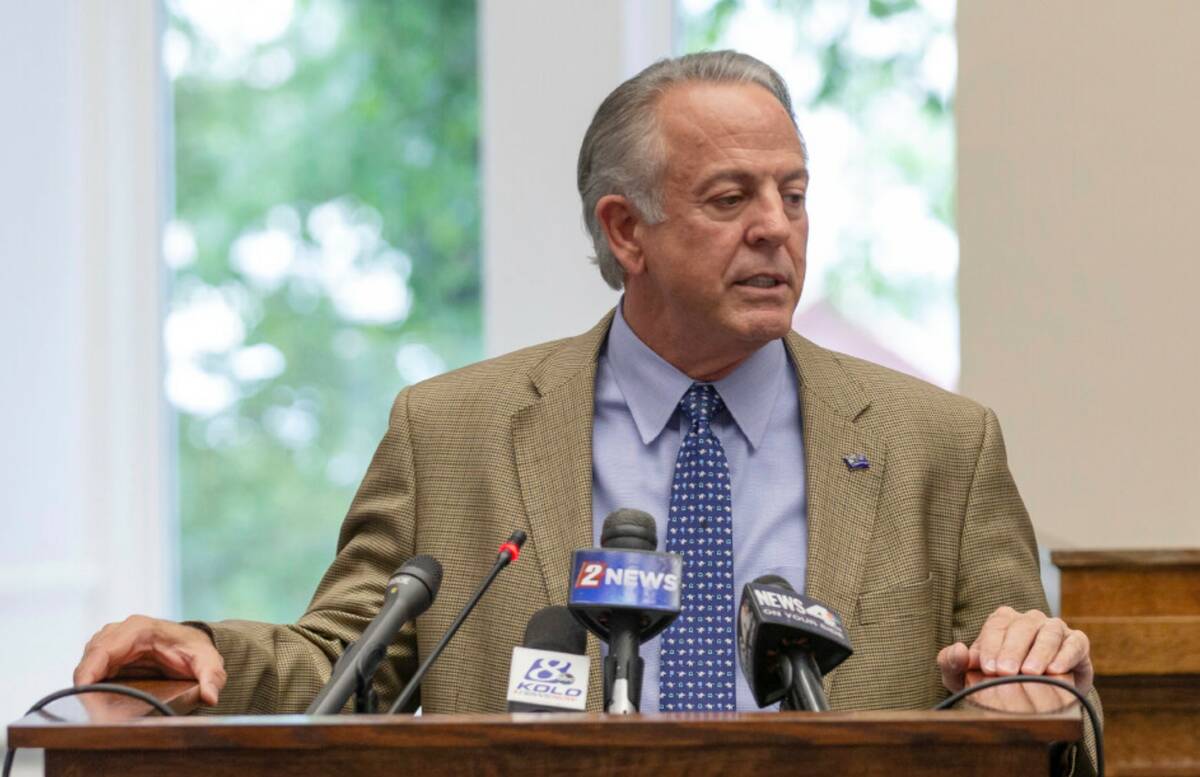Push and pull: Democrats, Republicans vie over housing solutions

Nevada Democrats and Republicans are playing a game of tug of war when it comes to the housing crisis, arguing who is to blame for the high costs of housing — and whose ideas would fix the problem.
Last week, Republican Gov. Joe Lombardo sent President Joe Biden a letter ahead of the president’s visit to the Silver State to talk housing, calling on him to release more federal land in Nevada for housing development and criticizing his administration for what Lombardo deems as policies that restrict growth.
Democrats shot back on Monday blaming Lombardo for Nevada’s housing crisis — despite the shortage of affordable housing that existed long before he took office.
“To be clear, Joe Lombardo bears the responsibility for Nevada’s housing crisis, full stop,” said Nevada State Democratic Party Chairwoman and Assemblywoman Daniele Monroe-Moreno during a news conference, joined by Assemblywoman Venicia Considine and a few Nevada senior citizens on Monday.
She specifically pointed to his vetoing several housing-related bills during the last legislative session. Those bills include Assembly Bill 298, which would have capped rent increases by no more than 10 percent for seniors; Assembly Bill 340, which would have established a new summary eviction procedure for tenants; and Assembly Bill 218, which prohibited a landlord from charging a tenant an amount that exceeds the amount of rent under the written rental agreement.
Another bill, Senate Bill 335, would have continued an eviction prevention measure that temporarily delayed summary evictions for up to 60 days for people with pending applications for rental assistance. Since Lombardo vetoed that bill, more than 30,000 evictions were granted in Nevada, Monroe-Moreno said.
In his veto messages on those housing bills, Lombardo said they placed onerous burdens on Nevada’s residential rental markets and created additional hurdles for landlords.
When asked if she supported Lombardo’s suggestion of releasing federal land for housing, Monroe-Moreno said it’s something to look at and talk about with Nevada’s federal delegation. Not all federal lands are inhabitable, and environmental issues also have to be considered, she said.
“That’s not the one-stop, solve-all for our housing problems here in Nevada,” she said.
Monday’s news conference also served as a platform for Nevada Democrats to encourage voters to elect Democrats up and down the ballot in 2024, promising to lower the costs of housing.
“With your help and with your vote, we will elect folks to the state legislature who have your best interests in mind and who will finally give Nevada families some relief,” Monroe-Moreno said.
Lombardo, who broke the record for a Nevada governor vetoing the most bills in a single session in 2023, risks losing that veto power in November if Democrats secure a supermajority in the Assembly and state Senate. Democrats already have a supermajority in the Assembly and are just one seat shy from it in the Senate.
The governor was unavailable for an interview Monday, but said in a statement his administration has worked to address the availability of housing through maximizing investments through the Nevada Housing Division and reducing regulatory burdens for developers.
“My administration is fighting to increase the available supply of housing in our state, which is a critical component of lowering costs and ensuring housing opportunities for all Nevadans,” he said in the statement.
Through the Nevada Housing Division, the state has authorized more than $420 million in bonding authority to develop and preserve more than 2,400 rental homes, and $200 million in bonding authority to support nearly 700 new homeowners in the last 12 months, according to his office.
There is evidence that rents have dropped in the Las Vegas Valley at the start of 2024, according to a report from Zillow.
Releasing federal land for development needs to be done to help resolve a shortage of available land for residential and commercial development, according to Nicholas Irwin, a UNLV assistant professor of economics and researcher at the Lied Center for Real Estate.
Many of those housing bills the governor vetoed would not have necessarily helped curb the housing problems, he said.
Providing more land for developers to buy and build housing will increase the supply and naturally help, he said.
Nevada’s housing crisis has been going on for a while, Irwin said. The state’s per-capita personal income is lower than other states, and the nature of the work offered lends itself to lower-wage jobs.
The crisis “really took off” after the COVID-19 pandemic with the rise of remote work, which allowed people from higher-income states to move to Nevada and force locals to compete with housing, Irwin said. Investment companies and large firms are buying housing, which further exacerbates the shortage of affordable housing, he said.
Housing is a complex issue, Irwin said, and leaders need to agree what the end goal is and the build from there.
“We all suffer from housing affordability issues,” he said. “We need our leaders to come together and reach common sense solutions that work for us and for our situation in a way that is productive for the people who elected them.”
Lombardo said Democrats in the Legislature have been “reluctant to have a comprehensive conversation about housing” and are playing politics with important issues.
“While they hold press conferences, I’ll continue to cut red tape, advocate for more federal land, deliver housing assistance, and fight Joe Biden’s inflation that has driven up costs.”
Contact Jessica Hill at jehill@reviewjournal.com. Follow @jess_hillyeah on X.